On 19 April 2019, Volodymyr Zelensky made history with his unlikely win in the Ukrainian presidential elections. Interestingly, Moscow trusted him to improve relations between the two countries. Russia stated then that they want him to show “sound judgment,” “honesty” and “pragmatism.”
The Man with Broken Promises
When he was inaugurated, Zelensky promised to bring peace to Ukraine, root out the corrupt elite, and serve just one term as president. The world turned upside down with the Russian full-scale invasion on February 24, 2022. Zelensky’s presidency is about to end in a bare month, on May 20, and now none of his commitments are likely to be fulfilled. Time can be a cruel and fickle master.
Domestic politics is still riddled with corruption, and Zelensky is unlikely to step down in the midst of a war. Let’s be honest about the latter: nobody will accuse him of breaking this promise of his. While elections cannot be held during martial law, Zelensky will continue to hold power even after his term ends. Nonetheless, it creates an unexpected challenge for Ukrainian democracy.
Precedent of Power Transition
The Ukrainian constitution, for example, does not explicitly prohibit holding presidential elections under martial law; however, it does state that the president should continue to serve until a successor is elected (Article 108) and that presidential terms last five years (Article 103). There are instances in which the constitution contrasts with (theoretically) subordinate law.
Lawyers are attempting to resolve this conflict by stating that after May 20, Zelensky will become acting president until the next election.
His opponents, on the other hand, interpret the law so that they argue that Ruslan Stefanchuk, speaker of the Ukrainian parliament, the Verkhovna Rada (in short, the Rada), should become acting president because the constitution designates him as the next in line if the president is unable to fulfil his duties.

Ruslan Stefanchuk (Photo: Parlamentul Republicii Moldova / Flickr.com)
There was a precedent in the relatively short history of the free Ukrainian statehood for the transition of power from the speaker of the Rada to the president. In 2014, during a popular uprising in Kyiv, acting president Viktor Yanukovych abruptly left the country, and speaker Oleksandr Turchynov assumed office. He then handed over authority to Petro Poroshenko, the victor of the subsequent presidential contest. However, Ruslan Stefanchuk, the incumbent speaker, has no intention of running for president. Already, he has declared Zelensky’s appointment as acting president until elections are held in the public sphere.
Servant of the People?
The criticisms, according to constitutional expert Andriy Mahera, whose 2004 refusal to ratify a fraudulent vote sparked the Orange revolution, are legal nonsense; but Mr Zelensky is nonetheless walking a tightrope.
“The president will be in position past the five-year mark only because there is a war on—no more, no less. He needs to understand this, and instead of fighting opponents, try to unite them around him,” Mahera told to The Economist.
So far, big-tent collaboration has not been Zelensky’s style.
The Rada is no longer unconditionally supportive of Zelensky as it previously was. Davyd Arakhamia, the leader of the Servant of the People faction in parliament, has stated that the political agreement that was present at the beginning of Russia’s full-scale invasion has disintegrated. Therefore, there is a possibility of a new speaker in parliament who may advocate to become acting president. Zelensky’s opponents in Servant of the People may attempt to restructure the parliamentary majority after May 20 to compel the president to transfer power to a new speaker due to increasing divisions.
They say after this date, the legitimacy of the president will be at least in question or even disappear, which means that it will be about the usurpation of power.
Supporters of the president rely on the principle of continuity of power. And they point to an article in the Constitution, according to which the powers of one president expire when another president takes the oath. Even during martial law, presidential elections cannot be held in accordance with the law, although the Constitution does not mention such a ban.
Such a Gordian Knot could be resolved by Ukraine’s Constitutional Court. But Zelensky himself is unwilling to be involved in it.
Firstly, such a move could be interpreted as proof that there are doubts even among Zelensky’s team about his legitimacy. Secondly, Zelensky is locked in a long-running dispute with Constitutional Court judges over their resistance to anti-corruption legislation. The court could well, therefore, issue a ruling that would only complicate the situation further.
The accusations of illegitimacy against Zelensky are unlikely to bother ordinary Ukrainians, but if they are accompanied by significant military and social problems, then they could become more serious.
The Polls are in Favor of the President
69 percent of Ukrainians support Zelensky remaining as president until martial law is lifted. In comparison, 15 percent prefer him to stay until new elections, as per a poll conducted in February by the Kyiv International Institute of Sociology.
Only 10 percent desire to witness the parliamentary speaker assume the role of acting president. His approval rating surpasses that of officials such as Poroshenko (who is likely to run again for the presidency, but just after the war ends) and potential opponent Valery Zaluzhny, the former top military commander. The public mostly agrees with Zelensky’s firm position concerning Russia. According to the polling by Razumkov Centre, only 18 percent of respondents would be in favor of making concessions to Russia if Western support were to stop entirely. One-third of respondents believe Ukraine should persist in its fight even if it stands alone; 22 percent propose attempting to halt the conflict without giving in, while the remaining individuals are undecided. As many as 53 percent would like to see Zelensky stand for a second term, though that figure is gradually declining. Also, the belief in an eventual “victory” remains at among 85 percent of the population, according to one recent poll. But opinions about what that means and when it will happen have begun to diverge strongly.
Can War Overwrite Democracy?
Zelensky, despite strong public support, is becoming anxious and beginning to overreact to accusations of illegitimacy. After Zaluzhny was dismissed, causing a loss of confidence in Zelensky, the president cautioned about the potential for an uprising and suggested that any challenges to his authority would be viewed as a scheme by adversaries to disrupt the nation. Authorities are considering action that may involve closing the widely-used messaging platform Telegram in the country.
The fluctuating economic and military backing from Western countries suggests that the situation is expected to deteriorate.
Ukrainian officials are becoming increasingly anxious about statistics related to cash flow, mobilization numbers, and weapons. Ammunition shortages are currently a problem that can only be resolved if Europe reestablishes its weapon production capabilities. In a war of attrition, every action matters. A well-known local proverb in Ukraine describes the situation: “While the fat man shrinks, the thin man disappears.”

Destructions in Kharkiv after Russian drone attack in the night on April 4, 2024 (Photo: State Emergency Service of Ukraine / Wikimedia Commons)
Zelensky was unquestionable as a war leader. He did not flee on the day of the Russian attack – although he could have – and, as a relatively inexperienced politician, he pledged not to give up the helm in the face of constant threats to his life and the conditions of life in Sparta. In difficult times, he was able to unite the nation behind him and relentlessly sought all possible support from the West. He has played a very important role in Ukraine, which is still resisting and refusing to surrender to the Russian bear.
On the other hand, a political system with regular power transitions that have been established in Ukraine for all its limitations and corruption has not entrenched a narrow political elite in power, setting it apart from most other post-Soviet countries, especially Russia and Belarus. The question is how the war is going to end because if it freezes (as many fear), it means that the President won’t be able to move from his position.







